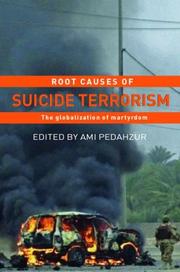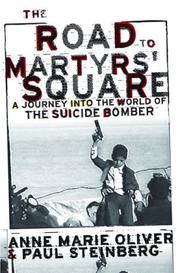| Listing 1 - 10 of 20 | << page >> |
Sort by
|
Book
ISBN: 222747341X Year: 2003 Publisher: Paris : Bayard,
Abstract | Keywords | Export | Availability | Bookmark
 Loading...
Loading...Choose an application
- Reference Manager
- EndNote
- RefWorks (Direct export to RefWorks)
Suicide bombers --- Terrorism --- Suicide --- Kamikazes (Attentats-suicides). --- Terrorisme --- Psychology --- Psychologie --- Terrorism - Geopolitics - Suicide Attempts - Human Sacrifices.

ISBN: 1850657106 1850657904 Year: 2005 Publisher: London : C.Hurst &Company,
Abstract | Keywords | Export | Availability | Bookmark
 Loading...
Loading...Choose an application
- Reference Manager
- EndNote
- RefWorks (Direct export to RefWorks)
Suicide bombers --- Terrorism --- Kamikazes (Attentats-suicides) --- Terrorisme --- Palestine --- Politics and government --- Politique et gouvernement
Book
ISBN: 9780195181029 Year: 2010 Publisher: Oxford : Oxford University Press,
Abstract | Keywords | Export | Availability | Bookmark
 Loading...
Loading...Choose an application
- Reference Manager
- EndNote
- RefWorks (Direct export to RefWorks)
Attentats-suicides --- Terrorisme --- Kamikazes (attentats-suicides) --- Aspect social. --- Aspect psychologique. --- Sociologie. --- Psychologie.
Book
ISBN: 9782130749943 2130749941 Year: 2016 Publisher: Paris: PUF,
Abstract | Keywords | Export | Availability | Bookmark
 Loading...
Loading...Choose an application
- Reference Manager
- EndNote
- RefWorks (Direct export to RefWorks)
Et si nous nous trompions ? Et si les attentats-suicides n’avaient rien à voir avec la guerre ? Et s’ils n’avaient rien à voir avec la religion ? Et si, même, ils n’avaient rien à voir avec quelqu’idéologie que ce fût ? Que se passerait-il si, en réalité, ce dont les kamikazes se voulaient les terrifiants acteurs était une simple surenchère appartenant au domaine des images ? En posant cette question, retraçant l’arc courant des premières explosions-suicides à la fin du XIXe siècle, jusqu’aux attentats meurtriers de Paris, en passant par les kamikazes japonais ou les auteurs de la destruction du World Trade Center, à New York, le 11 septembre 2001, c’est toute une histoire du flash visuel provoqué par la détonation des bombes portées, ou conduites, par les terroristes de l’absolu qui se trouve rejouée avec brio par Laurent de Sutter. Une histoire qui rejoindrait celle des spectateurs des médias de la postmodernité, ne quittant leur apathie organisée qu’au moment où un show plus violent que les autres finit par leur rappeler que, quelque part, le réel les attend
Kamikazes (attentats-suicides) --- Attentats-suicides --- Société de masse --- Suicide bombings --- Terrorism --- Terrorisme --- Sociologie --- Attentats-suicides. --- Société de masse. --- Sociologie.
Book
ISBN: 2080800841 9782080800848 Year: 2003 Volume: 544 Publisher: Paris : Flammarion,
Abstract | Keywords | Export | Availability | Bookmark
 Loading...
Loading...Choose an application
- Reference Manager
- EndNote
- RefWorks (Direct export to RefWorks)
Martyrdom --- Terrorism --- Suicide bombers. --- Violence --- Martyre --- Terrorisme --- Kamikazes (Attentats-suicides). --- Islam --- Religious aspects --- Islam. --- Aspect religieux --- Politico-religious --- Jihad
Book
ISBN: 9780822344285 9780822344391 Year: 2009 Publisher: Durham : Duke University Press,
Abstract | Keywords | Export | Availability | Bookmark
 Loading...
Loading...Choose an application
- Reference Manager
- EndNote
- RefWorks (Direct export to RefWorks)
Suicide bombers --- Suicide bombings --- Arab-Israeli conflict --- Political violence --- Kamikazes (Attentats-suicides) --- Attentats-suicides --- Conflit israélo-arabe --- Violence politique

ISBN: 3570006468 Year: 2002 Publisher: München Bertelsmann
Abstract | Keywords | Export | Availability | Bookmark
 Loading...
Loading...Choose an application
- Reference Manager
- EndNote
- RefWorks (Direct export to RefWorks)
Social psychology --- Suicide bombers. --- Martyrdom --- Terrorism --- Violence --- Kamikazes (Attentats-suicides). --- Martyre --- Terrorisme --- Islam.. --- Psychological aspects. --- Religious aspects --- Islam. --- Islam --- Aspect psychologique --- Aspect religieux

ISBN: 0415770297 0415770300 9780415770293 9780415770309 9780203964910 9781135987329 9781135987367 9781135987374 Year: 2006 Publisher: London : Routledge,
Abstract | Keywords | Export | Availability | Bookmark
 Loading...
Loading...Choose an application
- Reference Manager
- EndNote
- RefWorks (Direct export to RefWorks)
Suicide terrorism in its modern form appeared in the 1980s. The first organization to use this strategy was the Shi'ite Hizbollah in Lebanon. Later, it was adopted by many terrorist organizations in the Middle East and Asia. This new study shows how there are at least two reasons to question the central role that is assigned to religion and more specifically Islam when explaining suicide terrorism. First, suicide terrorism is a modern phenomenon, yet Islam is a very old religion. Except for two periods in the 12th and 18th centuries, suicide was never part of Islamist beliefs and behaviors. Actually, Islam clearly forbids suicide. Hence, the argument that Islamic religious beliefs are the main cause of suicide terrorism is inherently dubious. Second, many suicide attacks have been carried out by secular organizations with little connection to fundamentalist Islam: Palestinian Fatah, the Popular Front for the Liberation of Palestine, the Kurdish Workers Party. Moreover, one of the organizations that has employed this strategy devastatingly and regularly is the LTTE (Liberation Tigers of Tamil Elam). Not only are members of this organization not Muslim, most of them are not religious at all. This superb book contains essays by some of the world's leading scholars of terrorism and political violence. It is essential reading for students of terrorism, political science and Middle Eastern politics, and useful to students of social psychology, theology and history.
Suicide bombings --- Suicide bombers --- Terrorism --- Attentats-suicides --- Kamikazes (Attentats-suicides) --- Terrorisme --- Psychology. --- Religious aspects --- Islam. --- Psychologie --- Aspect religieux --- Islam --- Suicide bombings. --- Terrorism.
Book
ISBN: 9780367457617 9781032104232 9781003026303 Year: 2022 Volume: v. 28 Publisher: New York, NY : Routledge,
Abstract | Keywords | Export | Availability | Bookmark
 Loading...
Loading...Choose an application
- Reference Manager
- EndNote
- RefWorks (Direct export to RefWorks)
"Theories of Terrorism explains and advances the major theories of terrorism that address issues of becoming a terrorist, being a terrorist, and leaving terrorism, in a clear and accessible format for use by students and academics seeking to advance theoretically driven research in the area. Readers will gain an understanding of the most promising explanations of terrorism that have been developed to date and how they can be used to explore core substantive issues related to the topic. The content is delivered with a scholarly depth, though still accessible by students at different levels. The book offer explains for the three phases of radicalization, covering emerging topics such as women's involvement in terrorism, fear of terrorism, the code of the terrorist, and suicide terrorism. This is the first book in the Advances in Criminological Theory Series to address the issue of terrorism and emphasizes the use of theory for future research development. The style and content coverage of the book make it appropriate as a supplemental text in undergraduate courses on terrorism and political violence. The inclusion of current empirical literature and guidance for future research efforts gives the text appeal for graduate students and academics in the disciplines of criminology/criminal justice, political science, sociology, and interdisciplinary terrorism studies. The emphasis on theory and the radicalization process throughout the text will also make the book useful as a reference for general graduate-level theory courses within these areas"--
Terrorism --- Bombers (Terrorists) --- Criminology. --- Terrorists --- Terrorisme --- Terroristes. --- Criminologie --- Kamikazes (attentats-suicides) --- Research. --- Psychology. --- Psychology --- Recherche. --- Psychologie --- Criminology --- Research --- TERRORISM--RESEARCH --- BOMBERS --- CRIMINOLOGY --- Bombers (Terrorists).

ISBN: 0195116003 0190294175 0195184572 1281347035 0198027567 Year: 2005 Publisher: New York : Oxford University Press,
Abstract | Keywords | Export | Availability | Bookmark
 Loading...
Loading...Choose an application
- Reference Manager
- EndNote
- RefWorks (Direct export to RefWorks)
Don't expect to find here the usual cliches about suicide bombers and what drives them. In this unique study, Anne Marie Oliver and Paul Steinberg render the story of two intertwining, often clashing journeys. The authors lived for six months with a Palestinian refugee family in Gaza at the beginning of the intifada, and offer a gritty, poetic portrait of the time. They also provide an unrivalled documentary of the underground media they collected during the course of six years in the area. Although they could not have surmised as much at the beginning, they soon found themselves led through t
Suicide bombers --- Terrorism --- Kamikazes (Attentats suicides) --- Terrorisme --- Ḥarakat al-Muqāwamah al-Islāmīyah. --- Harakat al-Muqawamah al-Islamiyah.
| Listing 1 - 10 of 20 | << page >> |
Sort by
|

 Search
Search Feedback
Feedback About UniCat
About UniCat  Help
Help News
News